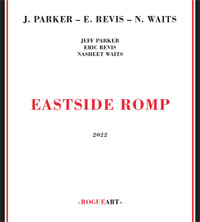Jeff Parker, Eric Revis, Nasheet Waits • Eastside Romp
Informal and short (38 minutes) it may be, but Eastside Romp is substantial, with tunes by all three, a collectively improvised title track, and Marion Brown’s “Similar Limits,” all but unheard since the alto saxophonist’s informal/substantial trio encounter with two Dutchmen, 1967’s Porto Novo. Its AAB form mirrors a blues: a short, catchy lick repeated and then answered. It’s quickly developed by the guitarist, so elegantly you could mistake the top of his solo for part of the written theme. Revis shadows him from a discreet distance; Waits’s clatter slightly recalls Han Bennink’s barrage on Brown’s version. Jeff Parker had recorded his own “Watusi” on his trio debut as leader, Like-Coping, in 2002. By comparison the newer version is a trifle slower and more authoritative -- Parker had grown in confidence and as a player since. It’s a basic little shuffle that shuttles between two chords a whole step apart -- a simple frame that lets the drummer solo within the riffing band. Parker’s “Wait” is a slow ballad with a lingering, singable melody; his great strength as a versatile guitarist is his love of (playing) same. Singing guitar calls for a commitment to a clean single-note line. Revis’s bass functions as rhythm guitar on the head: his double-stops fill in the harmony. Then his ostinatos keep it going. As guitarists who pack effects pedals often do on informal dates, Parker may take on a succession of axe voices in a single piece: spiky (he likes that old-jazz-guitar attack and quick decay), heavy-strings dark, tremolo-y, loopy. As ever, we count on the player’s guiding intelligence to make it all hang together. “Eastside Romp” is credited to the collective, but Waits is prime mover, kicking it off with a complex 11/8 syncopation for feet and rim shots that has a folkloric East Cuban vibe. The bassist falls in with an intermittent lick that helps clarify the quasi-triplety timing, the pauses allowing Revis to slip a few upper-register mbira embellishments in between. A guitarist could soar over such backing, but Parker’s too much the band-oriented beatsman for that: he’s down in the ditch with them, slipping in a little faux tabla just as picker Ray Crawford mimicked bongos with Ahmad Jamal. Waits’s two compositions are sort of anti-drummer pieces: one rubato, the other a tone poem -- the change-ups a date needs. The title of Revis’s “Drunkard’s Lullaby” sets up its anthemic sing-song and rollicking gait -- as if that drunk’s singing under your window. That’s all the cue Parker needs to inhabit the character. He’s so often reticent and self-effacing that it’s great to hear him cut loose with a raunchy/trebly/pedal tremoloed growl, and repeated chords that grunt like Horace Silver’s left hand. Parker can convey uncouthness without mucking the time or slumming. The sound: lack of bleed-through suggests Waits is isolated, but he plays as
discreetly, as if they’re all together. The bass has room sound in a good way,
sacrificing a little presence but not percussive punch. Parker is not one to hog the
decibels and doesn’t do so here. It’s a fine date, though its orphan status
speaks for itself. Eastside Romp doesn’t sound like the birth of a band;
it's more like a short, friendly conference. |

 astside Romp arrives cloaked in
mystery. There’s no information about how the session came about in the package or on
its label’s website; the CD’s valiant annotator is plainly in the dark. But
there’s no mistaking the casual informality of this one-day 2016 session, apparently
recorded at a home studio in Pasadena by Nolan Shaheed and mixed by Paul Bryan two years
later. Hard to say why it didn’t find a home till 2022. (France’s RogueArt is
known for some Quixotic releases, and its generic matching white, black and red sleeves.)
It brings together three mid-career African American masters: multi-disciplinary
Chicago-turned-LA guitarist Jeff Parker; inside/outside SoCal bassist Eric Revis,
who’s equally at home backing Branford Marsalis and Ken Vandermark; and
second-generation jazz drummer, best known as longtime collaborator with Jason Moran,
Nasheet Waits. Revis and Waits have history together, notably in the trio Tarbaby with
Orrin Evans; they’ve also backed roaring German saxist Peter Brötzmann.
astside Romp arrives cloaked in
mystery. There’s no information about how the session came about in the package or on
its label’s website; the CD’s valiant annotator is plainly in the dark. But
there’s no mistaking the casual informality of this one-day 2016 session, apparently
recorded at a home studio in Pasadena by Nolan Shaheed and mixed by Paul Bryan two years
later. Hard to say why it didn’t find a home till 2022. (France’s RogueArt is
known for some Quixotic releases, and its generic matching white, black and red sleeves.)
It brings together three mid-career African American masters: multi-disciplinary
Chicago-turned-LA guitarist Jeff Parker; inside/outside SoCal bassist Eric Revis,
who’s equally at home backing Branford Marsalis and Ken Vandermark; and
second-generation jazz drummer, best known as longtime collaborator with Jason Moran,
Nasheet Waits. Revis and Waits have history together, notably in the trio Tarbaby with
Orrin Evans; they’ve also backed roaring German saxist Peter Brötzmann.